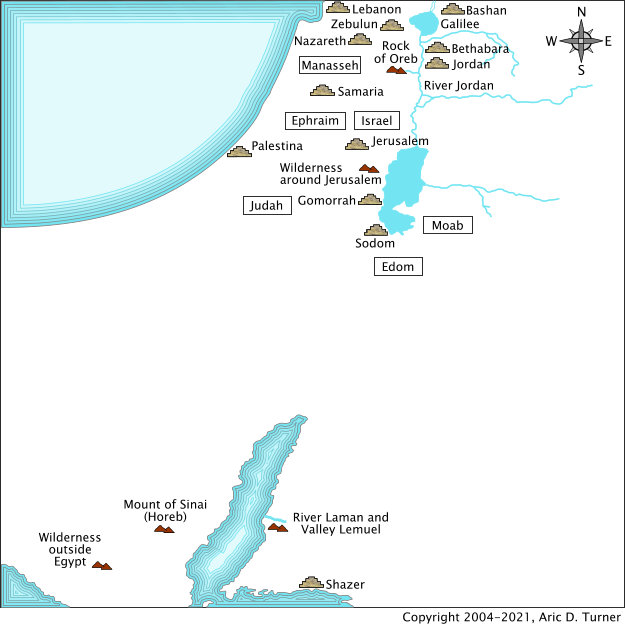Judah is in proximity to Jerusalem, Israel, Syria, and Manasseh. Judah is next to Ephraim and is lower in altitude than Jerusalem. Researchers locate Judah southward of Ephraim and that Jerusalem is located in the farthest northern portion of Judah.
Commentaries (
view it on a map)
I NEPHI 1:3 [1:4]: For it came to pass, in the commencement of the first year of the reign of Zedekiah, king of Judah (my father Lehi having dwelt at Jerusalem in all his days); and in that same year there came many prophets, prophesying unto the people that they must repent, or the great city Jerusalem must be destroyed.
Commentary: This verse references the places of Jerusalem, Judah, and the land of Lehi's inheritance. The city of Jerusalem is named in this verse as a 'great city'. This verse also identifies that Lehi lived in Jerusalem for his entire life. In I Nephi, the land of Lehi's inheritance is referred to as a different location than Jerusalem. The phrase 'first year of the reign' indicates that the people in Jerusalem use the calendar system of Judah. This would indicate Jerusalem and Judah were in close proximity to each other.
II NEPHI 8:39 [13:1]: For behold, the Lord, the Lord of hosts, doth take away from Jerusalem and from Judah the stay and the staff, the whole staff of bread, and the whole stay of water,
Commentary: This verse references the places of Jerusalem and Judah. This verse also occurs in Isaiah 3:1. Jerusalem and Judah are separate places, probably in proximity to each other.
II NEPHI 8:46 [13:8]: For Jerusalem is ruined, and Judah is fallen: because their tongues and their doings have been against the Lord, to provoke the eyes of his glory.
Commentary: This verse references the places of Jerusalem and Judah. This verse also occurs in Isaiah 3:8. Jerusalem and Judah are separate places, probably in proximity to each other.
II NEPHI 9:14 [17:1]: And it came to pass in the days of Ahaz the son of Jotham, the son of Uzziah, king of Judah, that Rezin, king of Syria, and Pekah, the son of Remaliah, king of Israel, went up towards Jerusalem to war against it, but could not prevail against it.
Commentary: This verse references the places of Israel, Jerusalem, Judah, and Syria. This verse also occurs in Isaiah 7:1. This verse names these places but provides no information regarding their locations. The phrase 'went up' indicates that Jerusalem is higher in altitude than Judah, Syria, and Israel.
II NEPHI 9:81 [19:21]: Manasseh, Ephraim; and Ephraim, Manasseh; they together shall be against Judah. For all this his anger is not turned away, but his hand stretched out still.
Commentary: This verse references the places of Ephraim, Judah, and Manasseh. This verse is also found in Isaiah 9:21. The wording indicates that there is a close coupling between Manasseh and Ephraim as if they could be located next to each other. The phrase 'together shall be against' indicates the two lands can combine forces and conduct war against Judah. This would mean one or the other or both border Judah. The ability to combine forces also indicates that Ephraim and Manasseh are next to each other.
II NEPHI 9:128 [21:13]: The envy of Ephraim also shall depart, and the adversaries of Judah shall be cut off: Ephraim shall not envy Judah, and Judah shall not vex Ephraim.
Commentary: This verse references the places of Ephraim and Judah. This verse is also found in Isaiah 11:13. The phrases 'shall not envy' and 'shall not vex' indicate the lands share common areas that both covet. This would indicate that the two lands are next to each other.
Map











